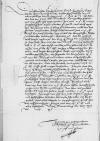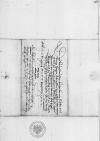Dem durchlauchten, hochgebornen fursten und herren, herren ⌊Albrechten⌋, von Gots gnaden marggraff zu ⌊Brandenburg⌋, / in ⌊Preussen⌋, / zu ⌊Stetin⌋, ⌊Pomern⌋, der ⌊Cassuben⌋ und ⌊Wenden⌋ hertzogk, burggraff zu ⌊Normberg⌋ und furst zu ⌊Rugen⌋, unserm hochgunstigen, lieben herren unnd freunde
Durchlauchter, hochgeborner furst, / hochgunstiger, lieber herre unnd freundt. / Unsere freuntliche unnd vleis willige dinste zuvoran. /
Aus Ewer Furstlichen Durchlaucht ⌊⌋, das den XVIII dits mondts zu ⌊Konigsberg⌋ gegeben und uns gestriges tags worden, / hab wir Ewer Furstlichen Durchlaucht notige sorgfeldigheit ⌊diesen landen⌋ zu gutt, / und auch was den ⌊ersamen vom Elbing⌋ zuantworten / radts von uns fordert, / vorstanden, / solchs auch, / dieweil uns Ewer Furstlichen Durchlaucht brieff hie nach fi(!)inden, / ins mittel den ⌊koniglichen rethen⌋ zubedencken vorbracht. / Befinden aber, das der mehrer teill dorzu gestimpt, / ⌊den vom Elbing⌋ die ausschiffung so freÿ solde sein, wie ⌊den von Dantzk⌋, / und sich beschwert, das Ewer Furstliche Durchlaucht das tieffe widder alten gebrauch und recessen / ane zulos ⌊koniglicher maiestet⌋, unsers allergnedigisten herrenn, / und dieses koniglichen raths mit wissen unnd willen / geschlossen, / anzeigende, das kortz zuvor Ewer Furstliche Durchlaucht von der ⌊Mymel⌋ und andern ortern auszuschiffen getreidt und andere wahre het gestattet, / welchs wir, / wie es ⌊bei uns ÿm rate⌋ vorhandelt, vortrauter weiss Ewer Furstliche Durchlaucht nicht habe mogen vorhalten. / Hieraus, was ⌊den vom Elbing⌋ widder zuschreiben sei, / hat Ewer Furstliche Durchlaucht leichtlich zuermessen. / Es wirt auch derhalben der edel, ernvhest her ⌊dantzker castellan⌋, / der sich zu Ewer Furstlichen Durchlaucht zubegeben diese tage vorgenommen, / hirinne von der ⌊hern rethe⌋ wegen weitern bericht, / und sonst auch was wir uns mit ym Ewer Furstlichen Durchlaucht zum besten trewhertziger meÿnung beredt, / mitbringen, / von dem / vil andere sachen, die aus der federn nicht wollen, Ewer Furstliche Durchlaucht wirt vorstehen, / hirumb wir fast ym ende dieser ⌊tagefart⌋, mit geschefften beladen, / dis unser schreiben ins kortze gestelt, / freuntlich bittende, in angefangener gunst gen uns uffzunehmen, / hiemit wir uns Ewer Furstlichen Durchlaucht mit vleis befelhenn.

